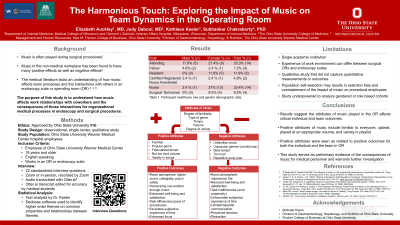Monday Poster Session
Category: General Endoscopy
P1989 - The Harmonious Touch: Exploring the Impact of Music on Team Dynamics in the Operating Room
Monday, October 23, 2023
10:30 AM - 4:15 PM PT
Location: Exhibit Hall

Has Audio

Elizabeth D. Auckley, MD
Medical College of Wisconsin
Milwaukee, WI
Presenting Author(s)
Elizabeth D. Auckley, MD1, Judy Daboul, MD2, Kathleen R. Keeler, PhD3, Subhankar Chakraborty, MD, PhD3
1Medical College of Wisconsin, Milwaukee, WI; 2The Ohio State University Wexner Medical Center, Columbus, OH; 3The Ohio State University, Columbus, OH
Introduction: Music is often played during surgical procedures. Music in the non-medical workplace has been found to have many positive effects (facilitating learning, reducing stress, and mood regulation) as well as negative effects (distraction, increasing occurrence of errors and mistakes, increasing tension and psychological distress). The medical literature lacks an understanding of how music affects team processes and the interactions with others in an operating room (OR). The purpose of this study is to understand how music affects work relationships with coworkers and the consequences of those interactions for organizational medical processes in the OR and endoscopy.
Methods: This was a prospective, single center, qualitative study of healthcare professionals. First-person interviews were conducted virtually on Zoom and recorded on Otter.ai. Participants were recruited at Ohio State University Wexner Medical Center through hospital employee messaging. Participants were required to be 18 years or older, english speaking, and work in an OR environment to be eligible. Interviews were analyzed using Dedoose to identify higher-order themes, based on common properties, as well as relationships between these themes.
Results: Forty-four interviews were conducted from a variety of sources including surgeons, anesthesiologists, fellows, residents, surgical technicians, and nurses. Interviews resulted in 1620 coded excerpts. Informants reported that music attributes such as familiarity, upbeat/fast paced, and preferred volume were perceived as positively contributing to the OR experience. Informats reported that music enhanced collegiality, humanized coworkers by learning about their music preferences, and facilitated perceptions of belonging and psychological safety within the OR. Respondents noted this music enhanced their focus during procedures, enhanced team efficiency, and contributed to their wellbeing. In contrast, music that lacked these attributes was reported to have a negative impact on individual focus and wellbeing, as well as team efficiency, communication, and cohesion (Table1).
Discussion: Results from our qualitative study suggest the type of music played in the OR affects critical individual and team outcomes. In general, informants reported that music that was familiar to everyone, upbeat, and played at an appropriate volume improved OR outcomes for both the individual and the team as a whole. This study serves as preliminary evidence of the consequences of music for medical personnel.
Disclosures:
Elizabeth D. Auckley, MD1, Judy Daboul, MD2, Kathleen R. Keeler, PhD3, Subhankar Chakraborty, MD, PhD3. P1989 - The Harmonious Touch: Exploring the Impact of Music on Team Dynamics in the Operating Room, ACG 2023 Annual Scientific Meeting Abstracts. Vancouver, BC, Canada: American College of Gastroenterology.
1Medical College of Wisconsin, Milwaukee, WI; 2The Ohio State University Wexner Medical Center, Columbus, OH; 3The Ohio State University, Columbus, OH
Introduction: Music is often played during surgical procedures. Music in the non-medical workplace has been found to have many positive effects (facilitating learning, reducing stress, and mood regulation) as well as negative effects (distraction, increasing occurrence of errors and mistakes, increasing tension and psychological distress). The medical literature lacks an understanding of how music affects team processes and the interactions with others in an operating room (OR). The purpose of this study is to understand how music affects work relationships with coworkers and the consequences of those interactions for organizational medical processes in the OR and endoscopy.
Methods: This was a prospective, single center, qualitative study of healthcare professionals. First-person interviews were conducted virtually on Zoom and recorded on Otter.ai. Participants were recruited at Ohio State University Wexner Medical Center through hospital employee messaging. Participants were required to be 18 years or older, english speaking, and work in an OR environment to be eligible. Interviews were analyzed using Dedoose to identify higher-order themes, based on common properties, as well as relationships between these themes.
Results: Forty-four interviews were conducted from a variety of sources including surgeons, anesthesiologists, fellows, residents, surgical technicians, and nurses. Interviews resulted in 1620 coded excerpts. Informants reported that music attributes such as familiarity, upbeat/fast paced, and preferred volume were perceived as positively contributing to the OR experience. Informats reported that music enhanced collegiality, humanized coworkers by learning about their music preferences, and facilitated perceptions of belonging and psychological safety within the OR. Respondents noted this music enhanced their focus during procedures, enhanced team efficiency, and contributed to their wellbeing. In contrast, music that lacked these attributes was reported to have a negative impact on individual focus and wellbeing, as well as team efficiency, communication, and cohesion (Table1).
Discussion: Results from our qualitative study suggest the type of music played in the OR affects critical individual and team outcomes. In general, informants reported that music that was familiar to everyone, upbeat, and played at an appropriate volume improved OR outcomes for both the individual and the team as a whole. This study serves as preliminary evidence of the consequences of music for medical personnel.
Disclosures:
Elizabeth Auckley indicated no relevant financial relationships.
Judy Daboul indicated no relevant financial relationships.
Kathleen Keeler indicated no relevant financial relationships.
Subhankar Chakraborty: Coloplast – Consultant. Medtronic – Consultant.
Elizabeth D. Auckley, MD1, Judy Daboul, MD2, Kathleen R. Keeler, PhD3, Subhankar Chakraborty, MD, PhD3. P1989 - The Harmonious Touch: Exploring the Impact of Music on Team Dynamics in the Operating Room, ACG 2023 Annual Scientific Meeting Abstracts. Vancouver, BC, Canada: American College of Gastroenterology.

